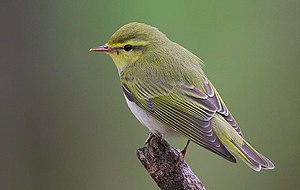Various Passeriformes (perching birds) are commonly referred to as warblers. They are not necessarily closely related to one another, but share some characteristics, such as being fairly small, vocal, and insectivorous.

Sylvioid warblers
editThese are somewhat more closely related to each other than to other warblers. They belong to a superfamily also containing Old World babblers, bulbuls, etc.
- "Old World warblers", formerly all in family Sylviidae
- Leaf warblers, now in family Phylloscopidae
- Typical bush warblers, now in family Cettiidae
- Grass warblers and megalurid bush-warblers, now in family Locustellidae
- Marsh and tree warblers, now in family Acrocephalidae
- True warblers or sylviid warblers, remaining in family Sylviidae or moved into the Timaliidae
- Cisticolid warblers, family Cisticolidae
- Malagasy warblers, the newly assembled family Bernieridae
Passeroid warblers
editThe two families of American warblers are part of another superfamily, which unites them with sparrows, buntings, finches, etc.
- Olive warbler, monotypic family Peucedramidae
- New World warblers, family Parulidae
Other
edit- Tit-warblers or flycatcher-tits, family Stenostiridae
These are closely related to the titmice and chickadees
- Australasian warblers, family Acanthizidae
These are the most distinct group of warblers. They are not closely related at all to the others, but rather to the honeyeaters and fairy-wrens.
- Hawaiian honeycreeper—warbler-niched-(adaptive radiation), genus H. virens–common amakihi.[1] (See: List of adaptive radiated honeycreepers)
References
edit- Wilson, Eisner, Briggs, Dickerson, Metzenberg, O'Brien, Susman, & Boggs. Life on Earth, Edward O. Wilson, Thomas Eisner, Winslow R. Briggs, Richard E. Dickerson, Robert L. Metzenberg, Richard D. O'Brien, Millard Susman, William E. Boggs, c 1973, Sinauer Associates, Inc., Publisher, Stamford, Connecticut. (hardcover, ISBN 0-87893-934-2)